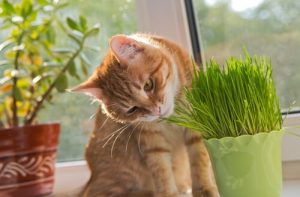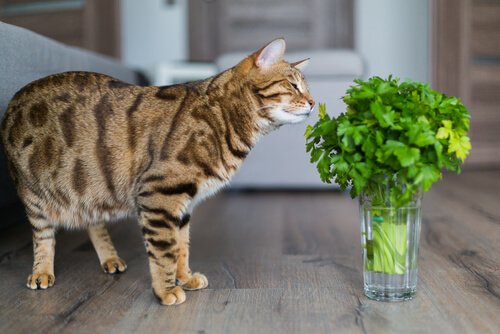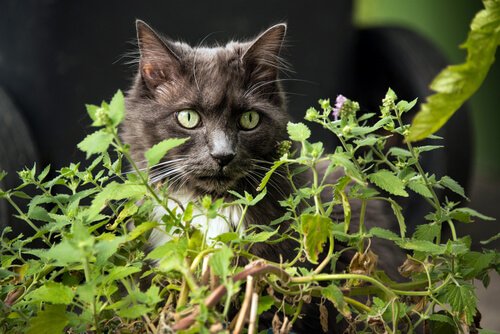Plants That Are Poisonous for Cats

Cats love to chew on grass. Even though they might instinctively know what’s good for them, they sometimes make mistakes. In this article, you learn about which plants are poisonous for cats. That way you can get rid of them if you have them in the house!
Are some plants poisonous for cats?
You might not realize it, but you could have created a very dangerous living environment for your cat. Most likely your intentions were only to decorate the home and make it look nice! However, cats are curious creatures and some plants and flower can be bad for them.
It can dangerous for a kitten that you recently bring them into your because they are unfamiliar with the surroundings and have very little experience with the dangers in life.

Another important fact will be how much contact your cat has had with the outside world. It’s different for a cat that has always lived inside a city apartment in comparison to an outdoor cat.
Of course, not all plants are poisonous and it also depends on how much and what part of the plant a cat eats. Some plants contain dangerous substances in the leaves, otherwise in the flowers and others in the bulbs.
That’s why it’s not important to know what plants are poisonous for cats and also known their effects because they may cause digestive, eye, neurological, dermatological, respiratory, or heart problems.

Below are some of the most dangerous plants:
1. Poinsettia
This plant is really common at Christmas time because of its red flowers. All parts of this plant are poisonous for cats because of the sap its coated in. If your cat eats it, they could have abdominal pain, diarrhea, vomiting, irritation of the mucosa, or hypersalivation. Even just touching this plant can cause itching and dermatitis.
2. Metroxylon Sagu
This small, tropical plant is often used to decorate homes. It has the same effects as the poinsettia, but if eaten excessively or repeatedly, it could also cause irreversible liver damage or even death.
3. Holly
This small tree, famous for its little red fruits, is a common decoration during Christmas. However, the leaves, seeds, and fruit are poisonous. It contains substances called saponins, which cause gastrointestinal problems for animals.
4. Ivy
There are many different types of ivy but all of them are poisonous for cats. Both indoor and outdoor varieties have extremely dangerous fruits. If your cat rubs against them, or other parts of the plant, they will get rashes, dermatitis, and blisters.
The main danger of ivy is if your cat eats it because it can cause anything from a fever to spasms, diarrhea, vomiting, and even changes in their heart rhythm. For older animals, eating this plant can even be fatal.
5. Lilies
These are very popular flowers to have in homes due to their beautiful colours. However, they also contain substances that can cause renal failure in cats. It doesn’t matter what part of the plant your cat is exposed to, the stem, flowers, leaves, roots, pollen, or pistils are very dangerous for cats.
For example, if your cat walks underneath or past some lilies, and a little pollen falls on their fur, your cat may then lick it later while cleaning themselves. The effects can even be lethal. Cats which survive eating this plant often have permanent kidney damage.
6. Azaleas
This is another of poisonous houseplant for cats. They contain a very powerful poison which affects the cell membranes and can cause neurological, gastrointestinal, and cardiovascular problems.
This poison can be found throughout the plant and eating just two or three leaves will be enough to poison your cat.
You can’t stop your cat from being curious, or not want to make your home look more beautiful. However, for the sake of your cat, don’t have any of these plants in your home !
Cats love to chew on grass. Even though they might instinctively know what’s good for them, they sometimes make mistakes. In this article, you learn about which plants are poisonous for cats. That way you can get rid of them if you have them in the house!
Are some plants poisonous for cats?
You might not realize it, but you could have created a very dangerous living environment for your cat. Most likely your intentions were only to decorate the home and make it look nice! However, cats are curious creatures and some plants and flower can be bad for them.
It can dangerous for a kitten that you recently bring them into your because they are unfamiliar with the surroundings and have very little experience with the dangers in life.

Another important fact will be how much contact your cat has had with the outside world. It’s different for a cat that has always lived inside a city apartment in comparison to an outdoor cat.
Of course, not all plants are poisonous and it also depends on how much and what part of the plant a cat eats. Some plants contain dangerous substances in the leaves, otherwise in the flowers and others in the bulbs.
That’s why it’s not important to know what plants are poisonous for cats and also known their effects because they may cause digestive, eye, neurological, dermatological, respiratory, or heart problems.

Below are some of the most dangerous plants:
1. Poinsettia
This plant is really common at Christmas time because of its red flowers. All parts of this plant are poisonous for cats because of the sap its coated in. If your cat eats it, they could have abdominal pain, diarrhea, vomiting, irritation of the mucosa, or hypersalivation. Even just touching this plant can cause itching and dermatitis.
2. Metroxylon Sagu
This small, tropical plant is often used to decorate homes. It has the same effects as the poinsettia, but if eaten excessively or repeatedly, it could also cause irreversible liver damage or even death.
3. Holly
This small tree, famous for its little red fruits, is a common decoration during Christmas. However, the leaves, seeds, and fruit are poisonous. It contains substances called saponins, which cause gastrointestinal problems for animals.
4. Ivy
There are many different types of ivy but all of them are poisonous for cats. Both indoor and outdoor varieties have extremely dangerous fruits. If your cat rubs against them, or other parts of the plant, they will get rashes, dermatitis, and blisters.
The main danger of ivy is if your cat eats it because it can cause anything from a fever to spasms, diarrhea, vomiting, and even changes in their heart rhythm. For older animals, eating this plant can even be fatal.
5. Lilies
These are very popular flowers to have in homes due to their beautiful colours. However, they also contain substances that can cause renal failure in cats. It doesn’t matter what part of the plant your cat is exposed to, the stem, flowers, leaves, roots, pollen, or pistils are very dangerous for cats.
For example, if your cat walks underneath or past some lilies, and a little pollen falls on their fur, your cat may then lick it later while cleaning themselves. The effects can even be lethal. Cats which survive eating this plant often have permanent kidney damage.
6. Azaleas
This is another of poisonous houseplant for cats. They contain a very powerful poison which affects the cell membranes and can cause neurological, gastrointestinal, and cardiovascular problems.
This poison can be found throughout the plant and eating just two or three leaves will be enough to poison your cat.
You can’t stop your cat from being curious, or not want to make your home look more beautiful. However, for the sake of your cat, don’t have any of these plants in your home !
This text is provided for informational purposes only and does not replace consultation with a professional. If in doubt, consult your specialist.








